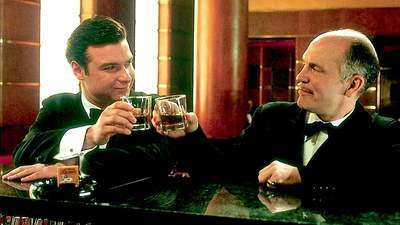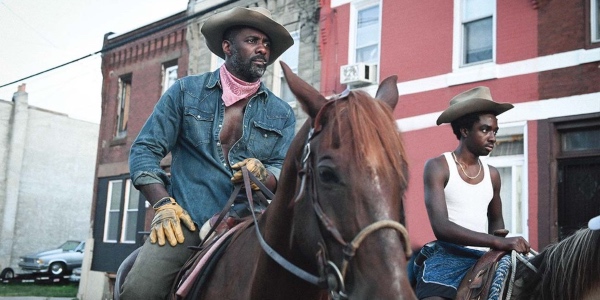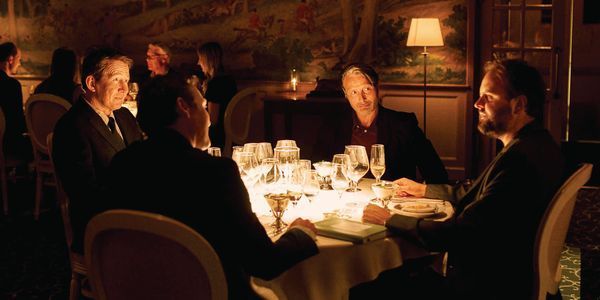After Kane, Before Mank: Revisiting RKO 281

While David Fincher’s recent Netflix film “Mank” adamantly sticks to Welles’ co-writer Herman J. Mankiewicz’s bitter viewpoint on how he came to write “Citizen Kane,” Benjamin Ross’ 1999 HBO movie “RKO 281” mainly presents director and co-writer Orson Welles’ viewpoint on the classic film’s production. It also pays some attention to Mankiewicz and several other real-life figures revolving around Welles, resulting in a vivid and compelling presentation of that troubled history behind the making of “Citizen Kane.”
The first act of “RKO 281” revolves around Welles’ struggle to find a project ambitious enough for him and his growing reputation after success in radio and theater. While he surely made a big impression on the folks of Hollywood with his glorious entrance, Welles, played by Liev Schreiber, soon finds himself running out of time without anything to be greenlit by RKO and its current president George Schaefer (Roy Scheider). But then, serendipitously, he is invited to the big manor of newspaper tycoon William Randolph Hearst (James Cromwell) in San Simeon, California. While getting the glimpses of the private life of Hearst and his longtime mistress Marion Davies (Melanie Griffith), Welles comes to have a brilliant story idea for his first movie, and then persuades Mankiewicz to write a screenplay based on that. As your average jaded Hollywood writer, Mankiewicz, played by John Malkovich, is reluctant at first, but he eventually agrees to work for Welles because it looks like the last opportunity in his dwindling movie career which has been deteriorated by his alcoholism. Having been one of Hearst and Davies’ regular guests for years, Mankiewicz surely knows some interesting personal facts about them, and he doesn’t hesitate to include a reference the pet name for Davies’ certain body part.
While he did his best at completing the screenplay within a short period of time as demanded by Welles, Mankiewicz is also well aware of the big danger of what he and Welles are attempting to do. Hearst may not be as powerful as he once was, but he still can wield considerable power and influence over the presidents and executives of those major Hollywood movie companies including Louis B. Meyer (David Suchet), and it’s only a matter of time before Hearst comes to learn of what Welles’ first movie is about. Nevertheless, Welles decides to take risks mainly because he believes that his movie will draw more publicity due to Hearst; Schaefer and RKO go along with his decision despite having understandable concerns.
What follows is a rather brief but exhilarating passage that offers a closer look into the production of “Citizen Kane.” We see Welles thoroughly studying and analyzing John Ford’s “Stagecoach” (1939) along with his cinematographer Gregg Toland (Liam Cunningham), and “RKO 281” then serves us a series of amusing moments on the set, including the instance when Welles and Toland dug a hole in the floor to get an extreme low-angle shot exactly envisioned by Welles. Because of that and many other incidents on the set, Schaefer and RKO executives have constant headaches everyday, but they have no choice but to keep tolerating Welles as legally bound to their contract with him.
However, these troubles turn out to be nothing compared to lots of wrath and threat from Hearst, who instantly embarks on suppressing Welles’ film by any means necessary once he is notified of its existence by infamous Hollywood gossip columnist Hedda Hopper (Fiona Shaw). As depicted in the film, Hearst and Louella Parsons (Brenda Blethyn), another notorious gossip columnist in Hollywood who had incidentally been on his payroll for years, put a lot pressure on Meyer and other Hollywood studio bosses. It’s chilling to see how they could nearly succeed in destroying “Citizen Kane” once for all.
Nevertheless, the screenplay by John Logan, which is partly based on Michael Epstein and Thomas Lennon’s Oscar-nominated documentary film “The Battle Over Citizen Kane” (1996), is surprisingly sympathetic to Hearst as well as Davies. Though it goes without saying that he is the chief villain of the story, Hearst looks genuinely hurt after learning more of how his private life with Davies is blatantly appropriated by Welles and Mankiewicz’s story, and that consequently brings out his worst sides. In the case of Davies, she is also not so pleased. She’s a fairly good Hollywood actress who is quite different from her tragically untalented fictional counterpart in “Citizen Kane,” and the film makes her reflect more on many unhappy aspects of her relationship with Hearst, which becomes more strained than before thanks to his battle with Welles’ movie.
The conflict between Hearst and Welles in the story eventually culminates to a coincidental private encounter between them not long before the eventual premiere of “Citizen Kane” in New York City in May 1941. Hearst seems to sense that Welles is not so different from what he once was many years ago, even though he is still regarding Welles with anger and contempt. Regardless of whether this dramatic moment really happened in real life as Welles claimed later, there is some ironic poignancy in Hearst’s last words to Welles in the movie: “My battle with the world is almost over. Yours, I’m afraid, has just begun.”
Although it must be pointed out that Logan’s screenplay frequently takes artistic liberties with its real-life story (Welles was actually never invited to Hearst’s manor, and it was in fact Mankiewicz who first conceived the story idea of “Citizen Kane”), the story and characters in the film are vividly presented under Ross’ competent direction, and his main cast members are uniformly excellent on the whole. Despite not resembling Welles all that much, Liev Schreiber does a good job of channeling Welles’ larger-than-life persona instead of resorting to mere imitation, and he is also supported well by a bunch of vividly colorful performers. Often looking as weary and sardonic as required, John Malkovich complements Schreiber’s spirited acting well on the screen, and their dynamic interactions establish the solid ground for a fictional moment of reconciliation between Welles and Mankiewicz after their serious clash over that controversial authorship of “Citizen Kane.” While Roy Scheider is ever-patient as a guy who must constantly balance himself between his business and Welles’ artistic ambition, James Cromwell and Melanie Griffith ably convey to us the human sides of Hearst and Davies’ flawed but ultimately enduring relationship, and Brenda Blethyn, Fiona Shaw, Liam Cunningham, and David Suchet are also effective in their small supporting parts.
As a TV movie, “RKO 281” looks plainer than “Mank,” but it’s still worth a watch thanks to its engaging storytelling and performance, and it will certainly make a wonderful double feature show along with Fincher’s film. Although quite different from each other in many aspects including tone and style, these two movies show and tell us a lot of things about “Citizen Kane” via their respective fictional narratives, and you may appreciate more of the sheer genius of “Citizen Kane” after watching them together.





